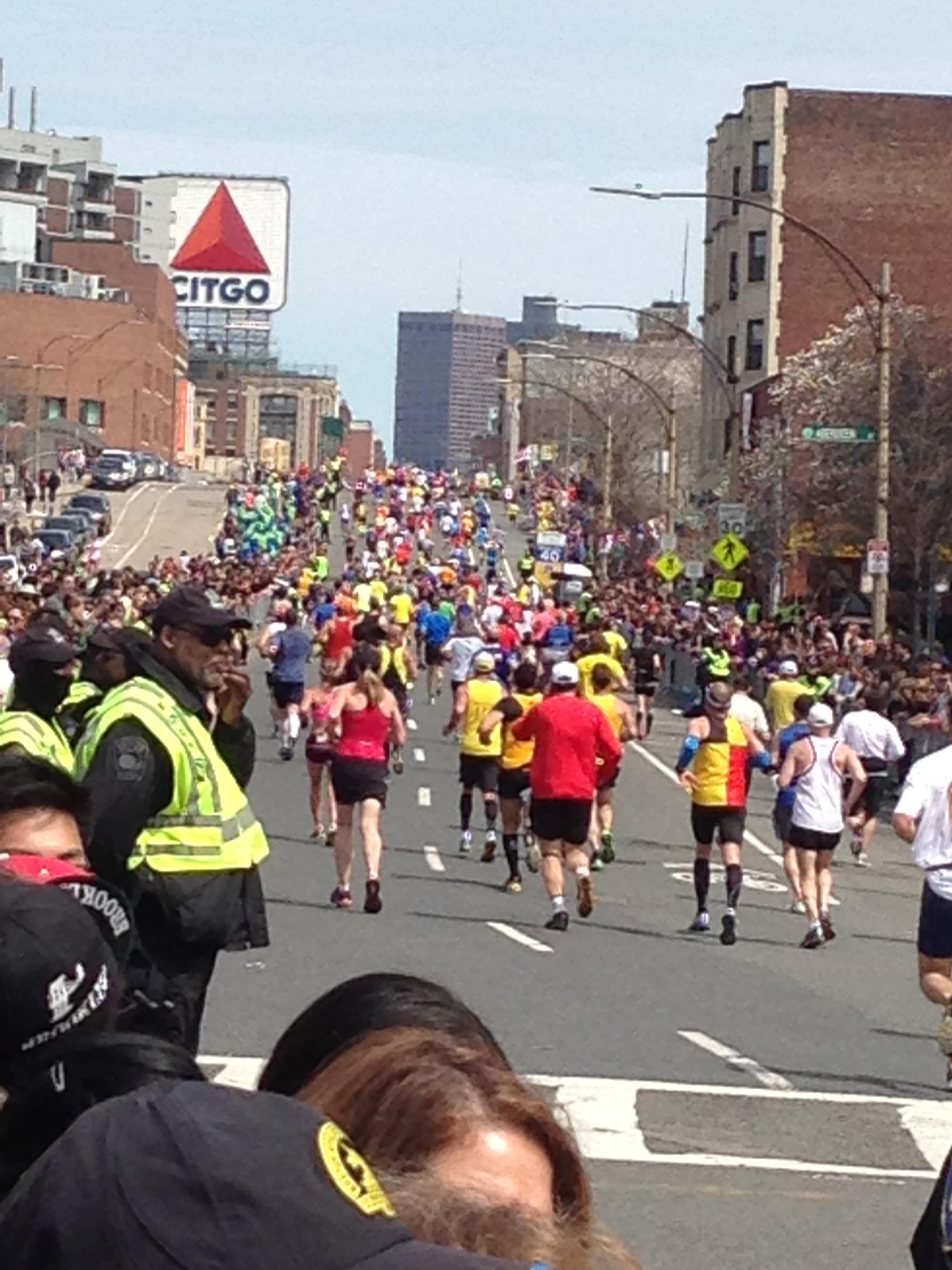Boston Will Endure: Life Under the Clutches of Tragedy
Boston residences sharing “close call” stories and the mentality to cope with tragic
By Katherine Smith, Staff Writer

The 2013 Boston Marathon. On Monday (April 15), bombs exploded near the finish line, killing three and injuring hundreds. Source: Katherine Smith/Arbitrage Magazine
Boston is a beautiful city. I’m from California, and I’ve dreamed of coming here ever since I was 10. Boston is home to me now. In my two years of living here, I have never felt unsafe — and not even the tragedy on Monday (April 15) will change that.
A day before a bomb killed three at the Boston Marathon, I was just one street away. I was on Newbury Street — the street parallel to Copley Square.
That’s the area where I take my parents to dinner when they visit. And I’m not the only one. All around me, I can see families and prospective students taking in the city around them. Despite the 600,000 people, Boston feels like a small town.
I am a student at Boston University. The annual Boston Marathon is known to us as Marathon Monday or Patriot’s Day. It is like a combination of New Year’s Eve and Christmas morning.
The weather is finally warm enough to shed the winter coats. Numerous barbecues and parties are organized along the route of the marathon to cheer on the runners. It is a muc h anticipated time of the year.
I’m in my second year at BU. This was my first Marathon Monday unencumbered by finals, term papers or homework. My morning began at a friend’s place with my roommates, making plans for the day over breakfast. Nobody had a clue of what was to come.
We soon left to go watch the marathon along Beacon Street. That is about a mile up from Copley Square. There, my friend Ali left the group to go watch the race at the finish line.
My friend Zoe wanted to go to Kenmore Square, about a mile away from the finish line. That was at about 3 p.m., 15 minutes after the blasts.
As we were walking, my phone began to ring. It was my mother, who lives in California. She frantically asked if I was OK; if everyone was OK.
I was confused — the news hadn’t reached us yet. She told me about the explosions, but like everyone around me, she didn’t know much else.
I then realized the crowd was going in the opposite direction of my group. I ran into Ali, who fortunately wasn’t able to get to the finish line. Her friend had gotten sick at the last moment.
We hurried back to my apartment and turned on the news. Worried family and friends out of state texted, messaged, and tried to call to make sure we were all safe.
Alyssa DeRosa, a second-year student at BU, was just metres away when the first bomb exploded.
“We were in the Lindt store on Boylston when we heard the bombs go off, and we managed to get behind the counter for safety,” she says. “People were using the store’s phone to call their loved ones. We started running when we realized there was trouble and ended up in the South End, where we got a cab back to campus.”
Alyssa’s story is just one of the dozens of “close calls” I heard on campus today. According to an email sent by the BU’s president yesterday (April 16), one of the three killed was an unidentified BU graduate student. The mood in school is rightfully tense.
The tour groups are a little smaller than usual. There are fewer students on the streets. The Boston subway looks emptier. There are more police officers on patrol. Unattended backpacks are seen as threats — an hour ago, I received an alert from the university, telling me to stay clear of the library.
The bombing claimed three lives, including an eight-year-old. At least 176 were injured, many of them in critical condition. Tragedy hit so close to home.
But tragedy happens all the time. That same day, coordinated attacks in Iraq killed 55 people. A day after, an earthquake in Pakistan killed 13.
The bombing is nothing short of heinous. But our lives will go on. They have to. This is not the first time Boston grieves — and it will likely not be the last.
In time, those responsible will answer for what they did. In time, April 15 will mark how Boston stood resolute against tragedy — and not how much that tragedy has pierced us.
Boston will endure. It is a beautiful city.
Katherine Smith is a journalism student at Boston University’s College of Communication in Boston, Mass. She also writes for The Buzz, an online publication at Boston University.























Share the post "Boston Will Endure: Life Under the Clutches of Tragedy"